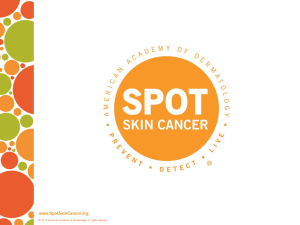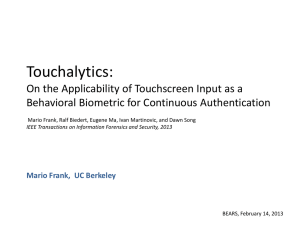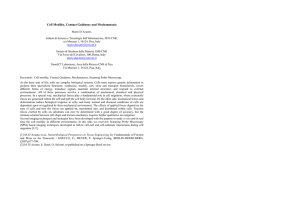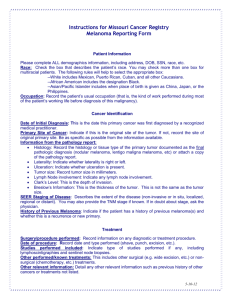here - MARK1 project
advertisement
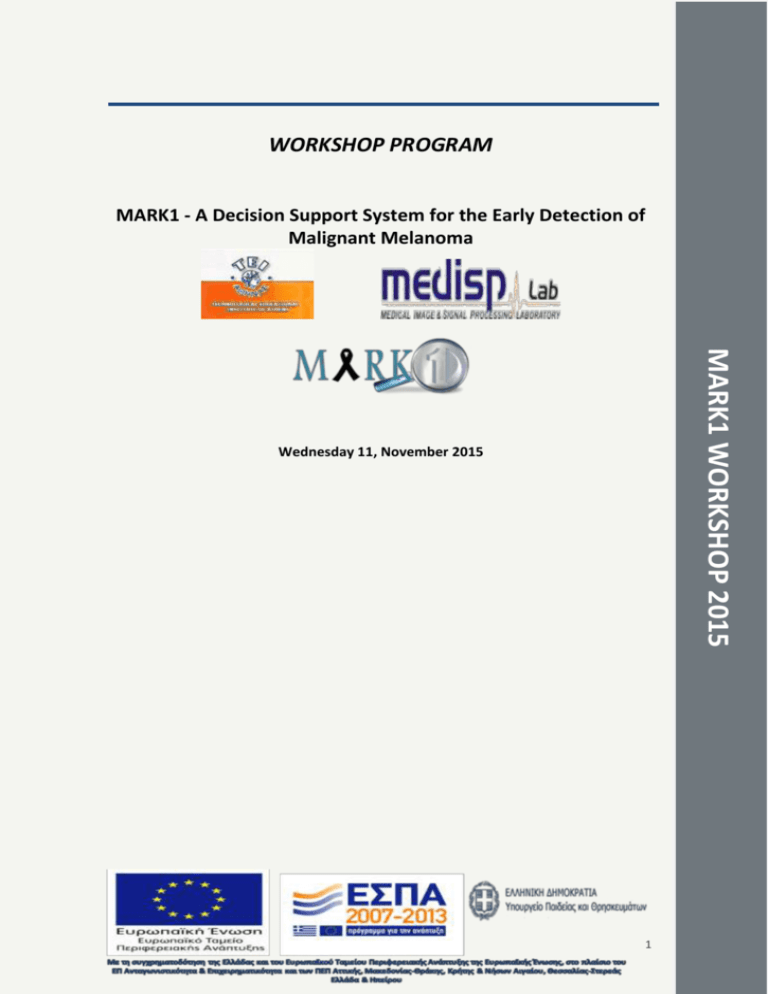
WORKSHOP PROGRAM MARK1 - A Decision Support System for the Early Detection of Malignant Melanoma MARK1 WORKSHOP 2015 Wednesday 11, November 2015 BIOMEP 2015 Programme v1 1 The workshop: The scope of the MARK1 workshop is a) to increase the level of public awareness regarding early detection of melanoma, b) to increase the overall visibility of the MARK1 project to the scientific community and c) to present the scientific results following the application of MARK1 to real world data. Venue: The workshop will be held at the premises of the Biomedical Engineering Department of TEI of Athens (http://www.teiath.gr/index.php?lang=en). TEI of Athens is located near the center of Athens, is easily accessible by public transportation and metro and may easily attract numerous scientists and students who are located at its premises (http://www.bme.teiath.gr/en_contact.html). Workshop registration and participation is free of charge. Certificate of participation will be given to all registered participants. Contact information: Associate Prof. D. Glotsos, Tel: +30 210 5385375 Email: mark1workshop@gmail.com Workshop Website: http://medisp.bme.teiath.gr/mark1/event/workshop-on-melanoma-2015/ BIOMEP 2015 Programme v1 2 MARK1 WORKSHOP 2015 Registration/Workshop Fees: Organizing Committee: Prof. D. Cavouras (Chair), TEI of Athens, GR Ass. Prof. G Sakellaropoulos, University of Patras, GR Asst. Prof. P. Asvestas, TEI of Athens, GR Asst. Prof. D. Glotsos, TEI of Athens, GR Dr S. Kostopoulos, TEI of Athens, GR E-K. Nikolatou, TEI of Athens, GR G. Xenogiannopoulos, TEI of Athens, GR MARK1 WORKSHOP 2015 Dr. K. Perakis, UBITECH Ltd., GR BIOMEP 2015 Programme v1 3 PROGRAMME Wednesday 11 November 2015 14:20 – 15:00 Registration 15:00 – 15:10 Welcoming session Prof. D. Cavouras, Department of Biomedical Engineering, TEI of Athens, Greece 15:10 – 16:20 Oral Sessions 15:10 – 15:30 MARK1 project description & Applications MARK1 WORKSHOP 2015 Dr. Konstantinos Perakis, UBITECH Research Department, UBITECH Ltd., Athens, Greece 15:30 – 15:50 Early stage detection of melanoma Theophilos Sakkis Ph.D., Valfour 1, Aegion Dermatology center 15:50 – 16:20 Decision Support System technologies towards early stage detection of melanoma Asst. Prof. D. Glotsos, Medical Image and Signal Processing Lab, Department of Biomedical Engineering, TEI of Athens, Greece 16:20 – 16:40 Discussion - Round table 16:40 – 17:10 MARK1 platform demonstration 17:10 – 17:20 Closing of workshop BIOMEP 2015 Programme v1 4 ORAL SESSIONS ABSTRACTS MARK1 project description & Applications Dr. Konstantinos Perakis UBITECH Research Department, UBITECH Ltd., Athens, Greece Keywords: Melanoma detection, mobile application, web interface, decision support systems Early stage detection of melanoma Theophilos Sakkis Ph.D. Valfour 1, Aegion Dermatology center, Greece Keywords: Melanoma, Diagnosis, ABCD Abstract Malignant melanoma represents a skin malignant tumor arising from melanocytes. It is the most serious oncologic problem in Dermatology because it affects a relatively younger population and has the tendency to metastasize at an early stage. The earliest possible recognition of melanoma represents the most important goal for BIOMEP 2015 Programme v1 5 MARK1 WORKSHOP 2015 Abstract The scope of the current session is to present to the target audience the scientific and technological scope of the MARK1 project, which is to provide a holistic solution aiming at addressing the need for early and accurate detection of skin lesions. In order to achieve this MARK1 introduces a screening solution that is easily accessible by the general public with the guidance, supervision and inspection of the primary care physician. MARK1 facilitates the accurate diagnosis ensured by a combination of new technology\ algorithms and specialist supervision. The development efforts include the design and development of a dedicated smart phone application to be used by the patient, and a web interface to be used by the primary care physician. The web interface of the physician integrates a set of image processing utilities and is interconnected through web services to the MARK1 Decision Support System which incorporates designated algorithms and the business logic behind the image analysis. dermatologists dealing with skin cancer screening. The evaluation of pigmented skin lesions is mainly based on the ABCD clinical rule (asymmetry in shape, border irregularity, color variegation and diameter). Decision Support System technologies towards early stage detection of melanoma Asst. Prof. Dimitris Glotsos Medical Image and Signal Processing Lab, Department of Biomedical Engineering, TEI of Athens, Greece Keywords: Melanoma, Diagnosis, Decision Support Systems BIOMEP 2015 Programme v1 6 MARK1 WORKSHOP 2015 Abstract Melanoma comprises one of the most lethal and difficult to treat forms of cancer with more than 100 000 cases worldwide each year. The annual incidence rate of the disease has an increasing tendency, which is attributed to modern lifestyle and long exposure to ultraviolet radiation that has been identified as among the most influential factors for triggering the disease. Early stage detection of melanoma has been shown as the most crucial step for treating the disease, since at early phases melanoma seems to be more vulnerable to available treatments. Computer-based image analysis and Decision Support Systems (DSS) have been proposed as potential second opinion tools to enhance the accuracy of self-skin examination and guide patients towards the urgency of a physician visit. DSS systems rely on pattern recognition and artificial intelligence approaches in order to assess the nature of suspicious moles. The advent of smartphone technology has made feasible the incorporation of DSS into web applications and Application Program Interfaces (APIs). Such systems may offer complementary information to the physician, assisting towards early diagnosis and reduction of falsely characterized as diseasefree cases for people who actually suffer by the disease. Additionally, such systems may alert patients to visit the dermatologist for suspicious moles increasing the probability of early stage detection of the disease. The purpose of this study is to present current decision support system technologies available for melanoma detection.
